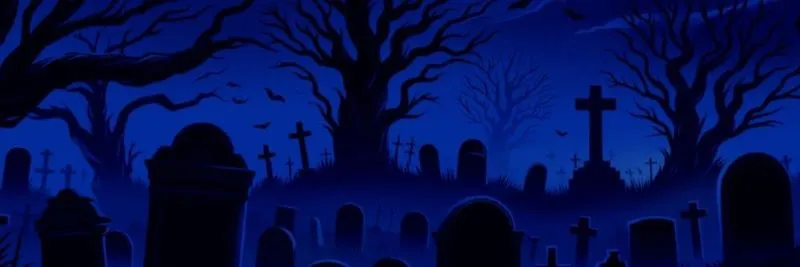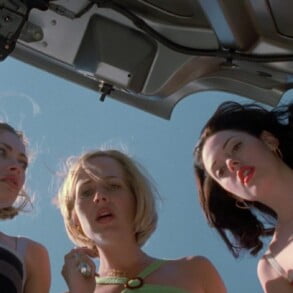LATEST:
Music is one of the most mysterious natural phenomena of our world and in Irish folk horror All You Need...
You might often feel like you’re already living through an apocalyptic nightmare, but I assure you that E.L. Katz’s new...
If you thought babysitting was tough, try stopping the birth of the Antichrist. The First Omen sweeps you into a...
Whoo-ee! I love me a scary spider movie. And like an intricate, hypnotically inviting web, no two spider movies are...
Haunted houses are scary and all, but you know what’s really terrifying?? Haunted…mirrors! Join your horror hosts Jon & Kim...
2024 is shaping up to be a big year for bugs and Kiah Roache-Turner’s monster spider movie Sting is here...
Dev Patel (The Green Knight) makes his directorial debut with the action-packed revenge thriller Monkey Man. Originally intended for Netflix...
The Prank. Those delightful, seemingly harmless little tricks we play on others for a laugh. But tread carefully, for the...




![the blair witch project 1999 best found footage horror movies final Motion [Podcast] THE BLAIR WITCH PROJECT 25th Anniversary Interview with Eduardo Sanchez and Michael C. Williams 10 The Blair Witch Project 1999 Best Found Footage Horror Movies-Final----Motion](https://nofspodcast.com/wp-content/uploads/2023/08/the-blair-witch-project-1999-best-found-footage-horror-movies-final-Motion.jpg)
![abigail ballerina vampire horror movie review 2024 [Review] Terror Wears a Tutu in Kooky Vampire Delight ABIGAIL 11 Abigail Movie Review 2024](https://nofspodcast.com/wp-content/uploads/2024/04/abigail-ballerina-vampire-horror-movie-review-2024-900x900.jpg)
![IMG 6454 [Podcast] Something, Something, Haunted Mirrors: MIRROR, MIRROR (1990) 12 Mirror Mirror (1990) Megan](https://nofspodcast.com/wp-content/uploads/2024/04/IMG_6454-900x900.jpg)
![the ceremony is about to begin indie horror found footage panic fest 2024 [Panic Fest 2024 Review] THE CEREMONY IS ABOUT TO BEGIN Blends Egyptian Lore with Found Footage Frights 13 The Ceremony Is About To Begin Indie Horror Found Footage Panic Fest 2024](https://nofspodcast.com/wp-content/uploads/2024/04/the-ceremony-is-about-to-begin-indie-horror-found-footage-panic-fest-2024-900x512.jpg)
![curse of the sin eater indie horror panic fest review 2024 e1713298275662 [Panic Fest 2024 Review] CURSE OF THE SIN EATER is an Indie Horror Delight 14 Curse Of The Sin Eater Indie Horror Panic Fest Review 2024](https://nofspodcast.com/wp-content/uploads/2024/04/curse-of-the-sin-eater-indie-horror-panic-fest-review-2024-e1713298275662-900x590.jpg)
![All You Need Is Death 2024 Olwen Fouere [Panic Fest 2024 Review] Irish Folk Horror Says Forget About Love, ALL YOU NEED IS DEATH 23 All You Need Is Death (2024) Olwen Fouere](https://nofspodcast.com/wp-content/uploads/2024/04/All-You-Need-Is-Death-2024-Olwen-Fouere-293x293.jpg)
![Azrael 2024 Samara Weaving Covered in Blood [Panic Fest 2024 Review] See A Blood-Soaked Samara Weaving in Post Apocalyptic Horror AZRAEL 24 Azrael (2024) Samara Weaving Covered In Blood](https://nofspodcast.com/wp-content/uploads/2024/04/Azrael-2024-Samara-Weaving-Covered-in-Blood-293x293.jpg)
![TFO 07276 [Review] THE FIRST OMEN Is a Prequel That Possesses with Style 25 Sonia Braga As Silvia And Nell Tiger Free As Margaret In 20Th Century Studios' The First Omen. Photo By Moris Puccio. © 2024 20Th Century Studios. All Rights Reserved.](https://nofspodcast.com/wp-content/uploads/2024/04/TFO-07276-293x293.jpg)
![INFESTED Still 5 [Panic Fest 2024 Review] 9/10 Spiders Give French Monster Horror INFESTED Eight Spooky Thumbs Up 26 Infested (2024) Spiders In The Van](https://nofspodcast.com/wp-content/uploads/2024/04/INFESTED-Still-5-293x293.jpg)
![Amityville A New Generation 1993 Suki Reflection with Noose [Podcast] Something, Something, Haunted Mirrors: AMITYVILLE: A NEW GENERATION (1993) 27 Amityville A New Generation (1993) Suki Reflection With Noose](https://nofspodcast.com/wp-content/uploads/2024/04/Amityville-A-New-Generation-1993-Suki-Reflection-with-Noose-293x293.jpg)
![Sting WellGoUSA5077 [Panic Fest 2024 Review] Monster Spider Horror STING Spins A Wild Web of Practical Effects Mayhem 28 Stong (2024) Hero](https://nofspodcast.com/wp-content/uploads/2024/04/Sting_WellGoUSA5077-293x293.jpg)
![Monkey Man 2024 Dev Patel Poster Crop [Review] Dev Patel's Action Epic MONKEY MAN Delivers Blood-Soaked Revenge 29 Monkey Man (2024) Dev Patel Poster Crop](https://nofspodcast.com/wp-content/uploads/2024/04/Monkey-Man-2024-Dev-Patel-Poster-Crop-293x293.jpg)

